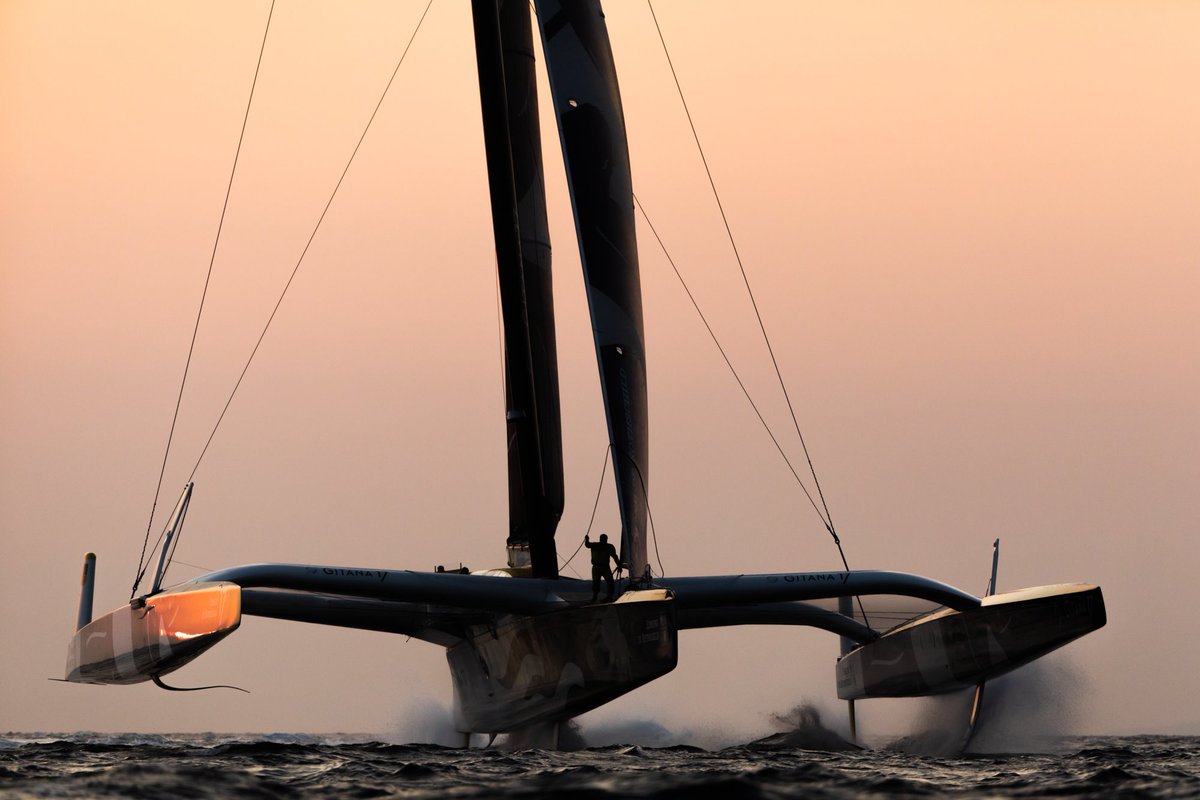

The efforts deployed by the men of the Maxi Edmond de Rothschild since leaving Ushant on Sunday are bearing fruit on this fourth day of the record. To exploit the chosen weather window as best they can, Franck Cammas, Charles Caudrelier and their four crew have had to link together a series of gybes, extending the course which will lead them down towards the equator. Since this morning though, they’ve been making headway in the trade wind and have got nicely into the groove on port tack so as to exploit the true potential of the five-arrow flying maxi-trimaran. At 17:00 UTC, the latest of the Gitanas had again clawed back some miles in relation to her virtual adversary and boasted a lead of 115 miles.

In the doldrums from tomorrow morning
Every passage through the doldrums is unique and like no other. Just hours before they take on the first of this Jules Verne Trophy, since the Maxi Edmond de Rothschild will likely feel the first signs of it at 6° North, Franck Cammas shared his impressions with us: “We’ve had a bit of a long transition between Madeira and the trade wind, but since last night we’ve finally made it into the trade wind system and we’re going to have a good 24 hours of calmer sailing. Late tonight, we’ll enter the doldrums, a quite complex zone where we’ll have to do some manoeuvring. We’ll need to be patient I think, as you can end up in some wind holes. Unfortunately, I reckon we’ll attack that section late tonight or even in the early hours of the following day. It’s always a bit better and easier to negotiate it during the day as you can see the clouds coming and you can anticipate their arrival a little.”
For now, the six men of Gitana Team are benefiting from a well-established NE’ly breeze in excess of 20 knots to pick up the pace. These conditions are particularly favourable for the 32-metre giant, which has managed to shake off the effects of the wind shadows created by the volcanic islands of Cape Verde and has since lengthened her stride. The average speed of 36.5 knots recorded in the last four hours bears witness to this.
After those 4 days, Franck Cammas, one of the skippers aboard the Maxi Edmond de Rothschild and David Boileau, boat captain and crew, reveal all about the change of mode. Indeed, in a matter of hours, the men tear themselves away from land and pull on their sailor’s garb. What is their experience and how do they deal with this switch from landlubber to sailor?
Franck Cammas : “Obviously the nights no longer resemble those on land”
“The transitions are always brutal, between the departure where you have your whole entourage around you on the dock and the moment where you find yourself at sea, in a crew, alone or forming a pair; it’s always pretty brutal. And then obviously the environment and the comfort we have on land and what we have aboard is diametrically opposite, so you have to get used to that. We’re quite aware of this aspect and know that the first few days are never the easiest. We await the coming days… Right now, three days out, we’re in the process of really getting into the ambiance and we feel increasingly at ease. On the one hand, there’s the rhythm of the watches, 24/7. Obviously, we no longer have the complete nights you can have on land. You have to get used to waking up quickly or in some urgency when you have to put in a manœuvre. You have to get used to sleeping during the day too, that’s an important element, and then there’s the environment, the noise, the motion, the ability to prepare something to eat… It’s a lot more complicated on the boat, especially during the first few hours where generally we don’t make proper meals… You have to get your head round all these things, for daily life and for your health, and get yourself sorted so you can endure 40 days. One thing for sure is that we won’t have the same rhythm as we do on land!”
David Boileau : “Hygiene is one of the major differences in terms of life on land”
“The fact that we spent the first night at sea before crossing the line off Ushant at 01:30 UTC gives us the impression that we set sail the day before. Ultimately, after just two days, you feel like you’ve already spent a lot of time at sea… Your ability to adapt aboard is of varying degrees of complexity depending on the conditions you encounter at sea. In this instance, we’ve had milder conditions at the start than on our first attempt and, on a personal level, I’ve immediately got into a good rhythm. I’ve got my sleep pattern sorted straightaway. I haven’t had a problem getting off to sleep or recuperating. I’ve immediately felt good and relaxed on the boat from the get-go.
I haven’t yet performed my ablutions since we set sail (laughs). Hygiene is one of the major differences in terms of life on land. We do what we can to stay clean, but you have to contend with the weather conditions and they dictate what you can do. At least I’m cleaning my teeth every day, which is something!”